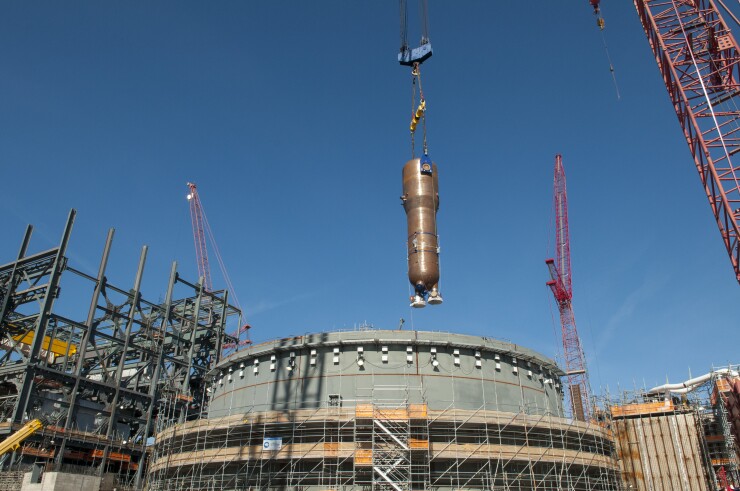BRADENTON, Fla. – Facing backlash from ratepayers and lawmakers for canceling South Carolina’s nuclear expansion project, Santee Cooper said Friday it will not implement planned rate increases for two years.
The state-run power agency, formally known as the South Carolina Public Service Authority, said in a release that it plans to withdraw the proposed rate increases for 2018 and 2019 due to its decision to suspend work on the nuclear project.

Santee Cooper said it plans to schedule “informational meetings” to discuss with ratepayers the factors leading up to the suspension of the V.C. Summer plant expansion, but the release did not address whether canceling the rate increases would affect the agency’s ability to pay debt service.
“We will continue to meet all debt obligations and maintain Santee Cooper’s financial integrity and strength,” spokeswoman Mollie Gore said in a separate statement to The Bond Buyer.
The SCPSA has $7.7 billion of outstanding bonds. Of that amount, $4.4 billion was issued to pay for its share of the two unfinished reactors.
On July 31, Santee Cooper said it had spent $4.7 billion in construction and interest for its 45% share of the project.
Since the March 29 bankruptcy filing of the prime project contractor, Westinghouse Electric Co., Santee Cooper and 55% project owner South Carolina Electric & Gas have spent months determining how much it would cost and the time it would take to finish the reactors. The project is about 35% complete.
Santee Cooper said to complete the project would cost it $8 billion for construction and $3.4 billion for interest. In October 2015, the agency’s fixed price contract with Westinghouse pegged Santee Cooper’s cost at $6.2 billion.
Westinghouse filed Chapter 11 specifically to shed more than $6 billion of debt it faced to complete the projet in South Carolina, and two new reactors for which it was the contractor at Plant Vogtle in Georgia.
Santee Cooper canceled the upcoming rate hikes “because we have reduced our capital spending by suspending the nuclear construction project and because we have a $976 million settlement with Toshiba,” Gore said.
“We will also be evaluating our financial plans and identifying budget cuts internally as necessary,” she said.
Analysts view cancellation of the South Carolina project positively because it eliminates construction risk, although they have questioned whether Westinghouse’s parent company, Toshiba Corp., can ultimately fulfill its recently negotiated parental guarantee.
Toshiba avoided delisting when it released its 2016 financial results Thursday, although auditors gave the company a qualified opinion and an adverse opinion. The company said it made provisions for the South Carolina and Georgia projects, but Toshiba still faces its own fiscal uncertainties.
The questionable status of the guarantee, risks related to winding down the South Carolina project, and risks surrounding the willingness of Santee Cooper's board to approve rate increases to maintain sound financial metrics led Moody's Investors Service to maintain a negative outlook on its A1 senior bond rating.
“We will be looking at their new forecasts shortly to assess whether they can maintain their A financial metrics without the rate increases,” analyst Dan Aschenbach said Friday. “If not, that is a significant rating pressure.”
S&P Global Ratings lowered Santee Cooper’s ratings to A-plus from AA-minus on Aug. 2 because of the Summer project debt burden without a corresponding asset. S&P said its negative outlook reflects uncertainties surrounding the ultimate magnitude of the utility's financial exposures.
Fitch Ratings, which assigns an A-plus rating to the debt, said Aug. 3, “If Santee Cooper decides to operate with slimmer margins, higher leverage or less cash to limit rate increases and ease the financial burden on its retail ratepayers this could weaken leverage and debt service metrics to a degree that would result in rating downgrades.”
Multiple investigations are underway into the reasons for canceling the project and the decisions reached by both Santee Cooper and SCE&G, and their plans for future rates.
South Carolina Gov. Henry McMaster is exploring options to continue construction, both the state House and Senate have appointed committees to review the project and recommend legislation, and South Carolina Attorney General Alan Wilson has opened an investigation, according to the Public Service Commission’s Office of Regulatory Staff.





